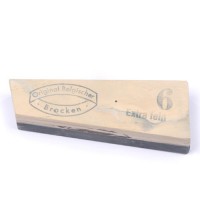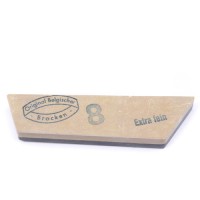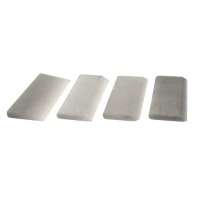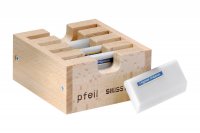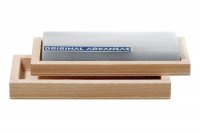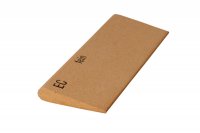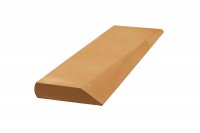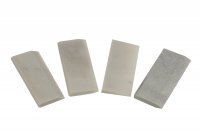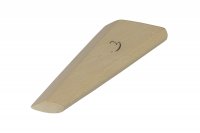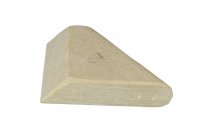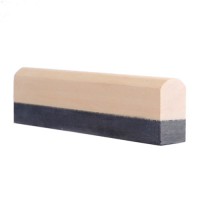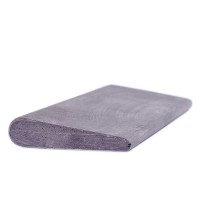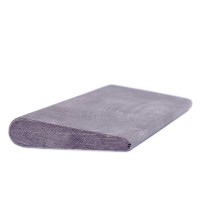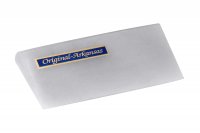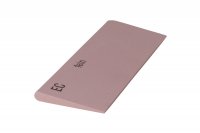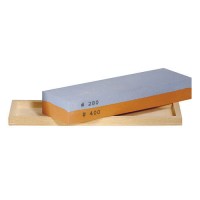A - Natural stones
Yellow Belgian chunk - a water whetstone.
This is the best known natural whetstone. It is available in two qualities: Quality I (extra-extra) and Quality II (extra-fine) and in different sizes and shapes: Bench stone in a rectangular shape, chunks in an irregular shape and as a shaped stone. The specified qualities are mainly optical grades. Quality II may have blemishes. However, it is identical to grade I in terms of stone quality. In addition, a distinction is made between the expensive, solid yellow chunks and the chunks and bench stone with a slate backing. The slate backing is necessary to stabilize the yellow stones, as the thin layers of stone in the quarries generally provide the best quality.
Blue Belgian chunk - also a water whetstone
In the search for an alternative to the dwindling number of yellow stones, a high-quality sharpening stone with almost identical properties was discovered, only in a blue-grey color, which comes from iron oxide. This stone contains approx. 30 % garnets compared to the yellow stone with approx. 40 %. As a result, this blue stone is somewhat "slower" than the yellow stone, but also more durable.
Arkansas - for use with oil or water.
They are also among the classic whetstones. However, in contrast to the Belgian chunks, the Arkansas is much harder. This means that the respective stone shape is largely retained even after years of use. Working with Arkansas is more time-consuming, but the result is a highly polished steel surface. The most common Arkansas is the gray hard Arkansas (H). There is also the yellow soft Arkansas (S) and the rare black Arkansas, the so-called Königstein (K). Arkansas stones also come in a variety of shapes. In addition to irregular chunks and box stones, there are mainly multiform stones, hollow chisel stones, stones with different edge profiles and round files. For sculptors, the sets of four small whetstones with different edge profiles have proven their worth.
Japanese chunks - (HONYAMA) for use with water.
They are directly comparable to the yellow Belgian chunks
B - Artificial stones
Arkansas artificial stones - for use with water or oil.
This whetstone is made of high-grade corundum. The color is white. It achieves fast material removal with good surface quality. It is available as a bench stone, gouge stone, multi-shaped stone and knife-shaped stone.
Corap whetstones - for use with water or oil.
This whetstone is made of corundum. The color is red to pink. It achieves a very good surface finish with good material removal. It is available in fine, medium and coarse grit sizes. We recommend the fine grit for high-alloy tools. These whetstones are available as bench stones, hollow chisel stones, multi-shaped stones and knife-shaped stones. These Corap whetstones are the most commonly used whetstones for woodturners - also due to their low prices.
Sicorite whetstones - for use with oil or water.
These whetstones are the highest quality artificial stones. They are comparable to the best natural Hardarkansas stones. The color is white. The extremely hard and fine crystals that make up these stones guarantee maximum resistance to wear and deformation. They guarantee the best surface quality and dimensional accuracy of the workpiece to be processed. These stones are available as bench stones, hollow chisel stones, multi-shaped stones, knife-shaped stones, sanding files and wood carving sets (four pieces with different edge profiles)
Silap whetstones - for use with water or oil.
These whetstones are made of silicon carbide. Their color is green-blue to grey. They are particularly suitable for machining hard metal and light metal. They are therefore less suitable for the usual alloyed steels. Due to their hardness, however, they are somewhat more dimensionally stable than the red corundum honing stones. They are also available as bench stones, hollow chisel stones, multiform stones and in knife form.
Further information
As most whetstones can be used with both water and oil as a lubricant, it should be noted that the user must choose one of the two. When working with oil, the rule is: once oil - always oil. Although oil is "smoother" to handle than water, there is a risk that traces of oil can get onto the piece of wood and leave stains.
The standard range of whetstones offered at the DRECHSELZENTRUM ERZGEBIRGE and in our online stores is limited to the most common qualities and shapes for carpenters, wood turners and wood sculptors. Carpenters prefer the Belgian chunks, wood turners the Corap whetstones and sculptors the Arkansas and Sicorit whetstones. However, wood turners are increasingly switching to the new possibilities with diamond files.
back to top... 